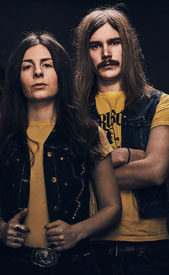|
Interview conducted February 17 2017 Interview published March 06 2017 |
"I simply can't write about dragons, war and stuff, because I haven't really been there."
Swedish retro rockers Honeymoon Disease made a stop in Stockholm on their national tour with fellow citizens of Gothenburg, Horisont. Metal Covenant was able to score an appointment with drummer Jimmy "Jimi Disease" Karlsson and guitarist/singer Jennifer "Jenna Disease" Israelsson before the show to see what is going on in a period somewhere in the first steps of the writing process for the band's second album.
![]()
Tobbe: Your first record, The Transcendence, was out like one and a half years ago and what's been going on in the Honeymoon Disease camp ever since?
Jenna: We have a new bassist and we've been out on the road many times in Europe and in Sweden. (Jimi:) Yes, we got a new bassist last summer, Cedric, and then we went out on tour right away and his first gig with us was the first gig on the tour, which lasted for 3 weeks in Europe. And we've been in Germany a lot and there's also been festivals. (Jenna:) I think we've really grown as a band, like we're getting used to going out playing, you know.
 Tobbe:
So how much were you guys playing together before the record was out then?
Tobbe:
So how much were you guys playing together before the record was out then?
Jenna: Well, it was quite a lot at that time too, but not at all in the same way, you know. (Jimi:) From the point where we started to play live together, when we became a complete band, we tried to play live as much as possible, really. Even when we worked with the record too, since we were so fresh and "We have to play gigs, even if we don't have a record.", you know.
Tobbe: If you listen to the record today, are there things you wished you had done differently?
Jenna: Not really. It's who we were then, you know. But of course you can go back… And when we now write new songs those ones of course feels so much better. But it's because we have developed, you know, as a band. (Jimi:) And you will never, I think, say that a record is complete. If you give it a year there will always be stuff that you wanna change. But it's awesome…
Tobbe: The music you perform is retro rock, or retro hard rock, and why did you really start to specifically play this type of music?
Jenna: It was pretty much the obvious choice for everybody in the beginning. When I and Anna [Anna "Acid" Skogö] started the Honeymoon Disease project we said that we were gonna play rock 'n' roll, you know. And when Jimi joined we became a band and we felt that we had pretty much similar references, because everybody comes from old hard rock and old rock 'n' roll.
(Jimi:) At the same time it's great to also have a little bit different influences from other bands we've played with, which is making it an awesome mix, you know. To me, in the moment when you create the music and when we're jamming, it's very obvious that we have different influences, but that they along the road merge into some kind of Honeymoon Disease filter and eventually we end up in the same vein.
Tobbe: About your second album. You've started to work on it already and how far have you went into the process at this point?
Jimi: With member changes and so we have focused, for a while, on the live gigs and get that thing together, you know. But after that things have started to run very fast and we have started to write a whole lot of new stuff together. So all our focus is on a new album, you know.
 Tobbe:
You play on the weekends a lot. Maybe you work Monday to Friday and then
you go away over the weekend…
Tobbe:
You play on the weekends a lot. Maybe you work Monday to Friday and then
you go away over the weekend…
Jenna: Yes, exactly, and that's so fun. Really. There's a lot going on, but this is what we want to do, so in the end it's worth it. (Jimi:) We would have gone out and seen bands anyway, but now we play ourselves, so the party gets even better. (Jenna:) And we get to try the songs that we're currently writing. Like tonight we will play new songs that will end up on the next record and it feels really great to see the response and get to know the songs outside the rehearsal room, you know.
(Jimi:) It's funny you mention this, because many bands keep the songs a secret and it may take over a year before they even start playing them. But we have said that we want to come out with new songs even if we don't release them and above all try the songs, because then we'll know which songs to record.
Tobbe: So when you're out playing, are people following your songs and know what you play?
Jimi: I would say that I'm astounded on almost every gig. A lot of people sing along and it's always surprising to see that so many people in fact come to actually see us, you know, and it definitely gets us psyched. (Jenna:) Yes, really. And it's fun to see people that you recognize from another gig you've played before in the same city and the audience is growing all the time. (Jimi:) Yes, and especially when you come back to the same city again. It's really a big difference and it's like everyone has brought five guys with them.
Tobbe: So let's go back to your coming album. Is some kind of development important already to the second album?
Jimi: Well, it depends. I think you always should try to develop, but maybe you shouldn't do it like The Beatles did and make a Sgt. Pepper ['s Lonely Hearts Club Band], you know. But you have to build a name, so with the second record, of course develop, but do what has worked out well, but do it even more.
Tobbe: So in what way do you try to find new stuff in the type of music you play? I mean, it has kind of been done before.
Jimi: We think about this a lot. It's, I think, very hard. Of course you want to completely break ground and come out with something completely new. (Jenna:) You know, as we were talking about, with our different influences in the band. Maybe we use that more and bring it to the music and bounce that back and forward with the rest of the band, you know.
And since we will have a new bassist on the coming album we will have even more influences than what we maybe first calculated with, so. Maybe pick out the little gems that aren't really obvious, kind of. (Jimi:) Yes, and it's not like "We will change genre completely.", but more like using little things that could make a big difference.
Tobbe: Almost every band changes some member early on and often before the first record is out, so how do you try to involve a new member into the writing process and the arrangements? I mean, bands often have a keystone, maybe the one who founded the band, or maybe a few, like, designated writers.
Jenna: Well, you go on tour right away and get to know one another. [Laughs] (Jimi:) Yes, I would say that that is the way to do it, or else you just stand there on rehearsal and "Okay. This is how the former bassist did it." and then the transition period gets longer, so to speak. We just "Go out, have fun together, get to know each other on the road.", you know. Maybe Cedric has something to say about this. [Cedric is present in the room during the entire interview.]
(Cedric:) I think it's much nicer to just fall into something quickly and kind of skip the starting period where you get to know each other. It's not so much thinking, but more doing, you know. You go out on tour and if you're going to write a record you just do it and then we're a band and we just go. (Jimi:) And it's so much better to give the new member freedom to be himself and not "You must play like the other guy did.". (Jenna:) Exactly. And we have never said that Honeymoon Disease must have a specific sound, but favors change all the time, you know.
Tobbe: Most kind of newly started bands I talk to say that they put a 100 percent time and effort into the band, but sometimes I find that hard to believe, so how does this matter fit Honeymoon Disease?
Jimi: It's extremely hard, but we want to do it, so we just fix it, you know. And that's kind of the eternal struggle for bands like us, on this level, to put down a 100 percent and all the time climb further. But as soon as you reach one step higher it's always worth it, because you get the energy to continue, you know.
Tobbe: Without mentioning any numbers, but is there any profit already now for a band of your size?
Jimi: I always say that everything we earn we invest in the band. We always want to go upwards. Of course we could try to use our own money, but that won't take us further and you stay at a certain level and then you kind of accept that. So money for us is something we invest in order to go further and to develop our music. Not to sound like Gene Simmons, but it's like any company and in the beginning you have to invest to get somewhere.
 Tobbe:
Is there anything you want to say with your music? Not necessarily a message,
but something you want to reach out to people with.
Tobbe:
Is there anything you want to say with your music? Not necessarily a message,
but something you want to reach out to people with.
Jenna: I think we got a great comment by a friend to Anna. After he had listened to the album, he was like "Who hurt you, guys?". The whole first album is a little bit melancholic and that's how we felt when we wrote it and a lot of things happened around that period. And it's great when people get what it's all about.
So the first album was very melancholic and about the next record I don't know, really. It's a great blend, I think. When the lyrics are written it's of course about a lot of things that you've experienced. Things that happened or things you want to happen. I simply can't write about dragons, war and stuff, because I haven't really been there. I haven't seen that dragon. So it's about real experiences or feelings, you know.
Tobbe: Do you sit down and like "Now I'm going to write some lyrics!" or does it come like piece by piece and you kind of write it down on your phone?
Jenna: Yes, absolutely. I have a phone full of notes. Little things. Maybe just a sentence that you pick up from somewhere. It's like there's a meaning to why I feel that I have to write it down. So I write it down and pick it up when I need to start building a song and it's like "This line goes great with that riff.", you know, and then it kind of keeps building.
Tobbe: Do you ever hit a wall when you're writing?
Jenna: There are definitely periods where I'm stuck, but then I just try to, you know, feel. Like "What do I feel right now?". And it's funny, and I think a lot of people do identify to this, because I can't write when I'm really happy. Something has to weigh me down in order for something to come out, really.
Related links:
www.honeymoondisease.com
www.facebook.com/honeymoondisease
![]()